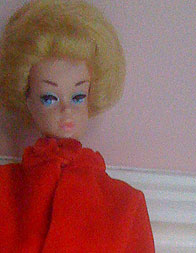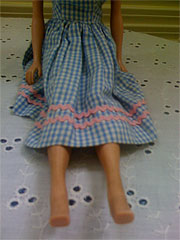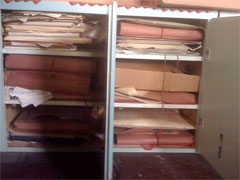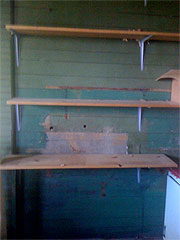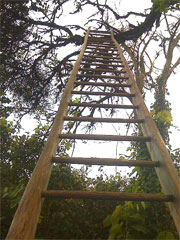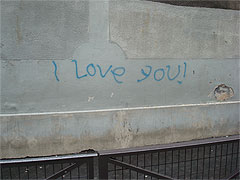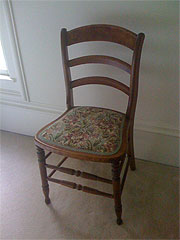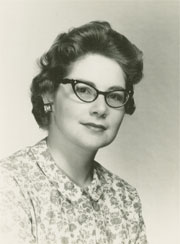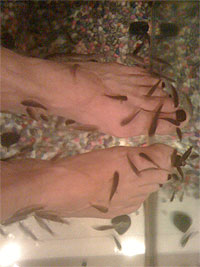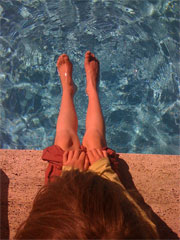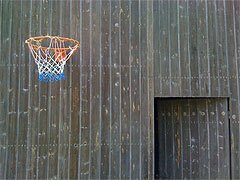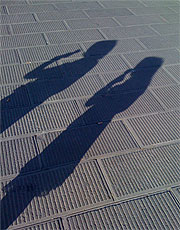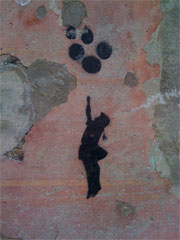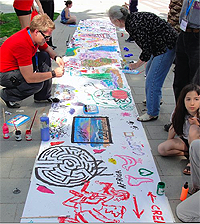Spilling Over
On Sunday, my children saw me for the first time in ten days. They ran to me with that amped-up fondness that the heart manufactures during a long absence. Into my arms they flung themselves and I received them with equal exuberance, only I held on a little too tight, a little too long, a little too fierce. Quickly they were wriggling to free themselves.

“Happy French Mother’s Day!” They sang this out in unison, prompted, I’m pretty sure, by De-facto who, having made very little of the American Mother’s Day earlier in the month, hoped to make good. Last week’s school art projects helped the cause: Buddy-roo proudly handed over a large blue envelope she’d made that read bonne fête maman! Inside, a picture of a flowerpot covered with sparkles, and a poem, copied meticulously, no doubt, at the behest of the teacher after she wrote it in perfect penmanship on the chalkboard.
Short-pants had crafted, in her class, a small box out of construction paper. Inside it there were tiny notes with micro-messages, mots doux as she called them. “Maman, mon coeur,” or “I love you night and day.” Sweet words, indeed, scratched out in her familiar pen. These hand-made gifts so precious, so heart-felt and so tear-inducing. Damn it.
“Why are you crying?” Buddy-roo asked. Before I could answer, Short-pants chimed in. “Because she’s happy and sad at the same time. Right maman?”
I guess I’ve said that before.
These days tears are everywhere. They reside barely below the surface, wherever I turn. A group of scientists discuss new ways of visualizing biology in order to better understand it, and I’m a little choked up. Thirty strangers sing happy birthday to me, I press the tears down. A liberated Alice returns from the Underland at the end of an in-flight movie and I’m hunting for Kleenex. My Pilates trainer urges me forward in grueling sets of 8 and 12, I’m concentrating to hold the tears in, at least until the workout is over and I’m on the stairs outside.
A taxi drove me to attend a meeting yesterday at an address that I, too, was unsure of. I was dropped at the wrong building, which – no surprise – put me on the brink of tears. Hold it together, I counseled myself. Running mascara has very little professional merit. The receptionist assured me it was only a ten-minute walk to the other #163 Quai-de-Whatever, where I wanted to be. So I walked. On the way, a man dressed in white painted an iron fence a shade even whiter. Does he still have a mother, I wondered, and does he think of her often? A hundred meters later, under a trestle, I passed a hooker wearing short black shorts and an ankle-length black leather coat that flew open behind her with every step of her stride. She smelled of liquor and hair spray as she went by. How about her mother?
Everybody had a mother, at some point. Every time I look at anyone I pass, I wonder, do they still?

Thoughts rush by on a train of remorse. Why didn’t I spend more time with her this last year? My week-long visits every-other month were a stretch to make happen at the time; they seem pathetic in retrospect. Now that my mother is gone, now that I can’t ever visit her again, isn’t it ludicrous that I didn’t go every month? Or that I didn’t just move in?
I run through the last week of her life, a string of images are frozen in my mind: watching her dress herself slowly and carefully, laughing because it was taking so long. How she sipped her special juice drinks with a straw, but elegantly. As she weakened, how she would regard herself in the mirror, as if she did not recognize the not-well person she had become. This image is especially strong because I, too, was in it, off to the side, watching myself watching her talk to her own reflection. “I don’t know how to do this,” she whispered. “Neither do I,” I’d said, unable to contain the tears. But she didn’t cry about it. Ever. At least not in front of me.
This morning my daughters’ longer-and-lankier-than-ever bodies were nearly impossible to stir, their jet lag, now a week old, as fierce as mine is after just returning a day ago. Buddy-roo grumbled and stretched and turned to the side, “scratch my back.” I caressed her, urging her, gently and then more rigorously, to wake up and rally for the day. I went to rouse Short-pants, who sweats in her sleep. I pulled the comforter off her shoulder and swept the damp hair off her forehead. Her sleep was deep, but when she saw it was me, she jerked her arm from under the covers and wrapped it around my neck, pulling my head right up to hers. It was a strong, firm grip, very deliberate.
“You can take your time letting go,” I told her. So she drew me in closer, even tighter.
Tears. Again. My emotions spilling out like an overfilled tank. Or to draw a truly sad and timely analogy, like an oil spill. No small trickling here. Rather a fountain of feelings gushing out because of some sloppy fissure; messy, embarrassing, uncontainable, washing up on the shore for everyone to see.
I have an odd and eccentric empathy for those BP engineers. Some spills are not so easily contained.
